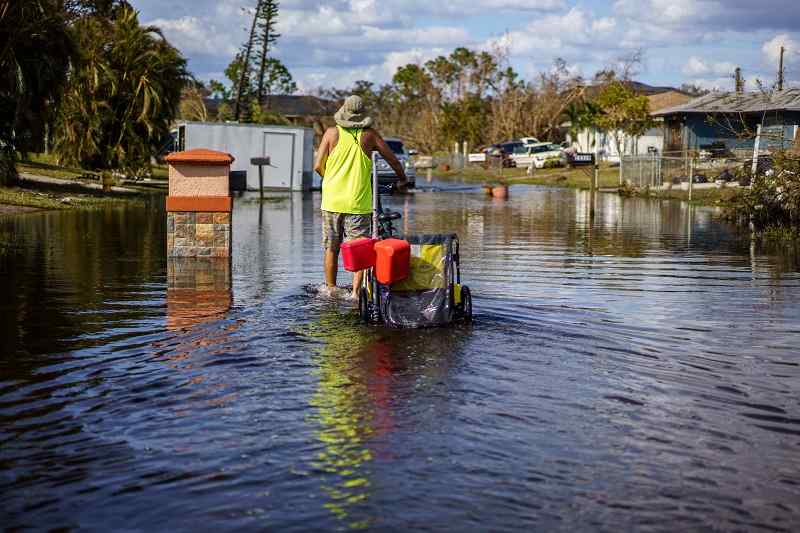Florida faced a housing crisis. Ian has made it worse.

Mike Ryerson of Harlem Heights in Fort Myers Beach, Fla., makes his way back to his home on a flooded street after Hurricane Ian surge waters flooded the area.
12:03 JST, October 4, 2022
ESTERO, Fla. – The billions of dollars in damage caused by Hurricane Ian has exacerbated an already urgent housing crisis for Florida, with thousands of displaced residents unsure where they’ll live in one of the country’s most expensive states.
On Monday, about 1,700 people remained in emergency shelters, many of them evacuated before their homes were either leveled by the 150 mph winds or rendered uninhabitable by a storm surge that flooded large portions of the state – leaving nearly 850,000 residents still without power five days after the hurricane made landfall. Others were living temporarily with family or friends, while some with few options remained in squalid conditions inside damaged houses.
In a state of luxury high-rise condominium developments and multimillion-dollar homes with stunning views of the surrounding waterfront, the hardest hit will be residents on fixed incomes and working poor families who make up the backbone of Florida’s economy, affordable housing advocates said.
“It’s a tragedy for them and it’s also a tragedy for the entire community, which has already been suffering from not having people able to live where they work,” said Jamie Ross, president and CEO of the Florida Housing Coalition, which earlier this year estimated that there is a statewide deficit of 500,000 homes that are affordable to lower- and middle-income families.
“We were already in a crisis before Ian came along,” she said.
State officials said 68 people died as a result of the storm, a toll that they said included two deaths from Charlotte County. Officials there, however, said 23 people were directly or indirectly killed by the storm. Authorities have said they expected the number to rise as more searches and autopsies are completed.
The breadth of the problem for survivors was on display inside the Hertz Arena entertainment center in Estero, now one of several congregate shelters operating in the state for hurricane victims.
Several hundred people milled around or lay on donated inflatable mattresses inside the stadium that is normally home to the Florida Everblades minor league ice hockey team.
A family of five camped out near one of the beer stands while more huddled near a chrome statue of a hockey player brandishing his stick. Everywhere were the sounds of barking dogs or babies crying – mixed with the heavy odor of a crowd of people who had not bathed since Ian leveled their communities last week.
Peggy Delaney, 71, had taken refuge with her three cats in one of the stadium bleachers, just above where a girl cuddled with a stuffed elephant on a mattress her family had placed in the penalty box area of the emptied-out ice rink.
“$169 a night!? I can’t afford that,” Delaney said out loud while scrolling through Airbnb options on her iPad.
She arrived to the arena Friday after being rescued from the condominium in Fort Myers she and a friend bought in June. On Wednesday, during the storm, she watched as three feet of water seeped into her unit – enough to upend her refrigerator and an antique dresser.
Now, with no place else to go and Social Security checks making up most of her income, the retired office administrator feels trapped in a different way.
She’s waiting to learn whether her homeowner’s insurance will cover the damage to the condominium, and whether the flood insurance claim she filed with the Federal Emergency Management Agency (FEMA) that morning will lead to temporary housing.
“They said that within 20 days they may be able to put me up somewhere,” Delaney said, about FEMA. “I’m hoping prices come down so I can buy something, but I’m afraid we won’t get money out of our condo now.”
Pausing, she added: “I haven’t been able to cry until I got here.”
Out in the lobby, Oscar Garcia stared at nothing in particular while sitting on his inflatable mattress. His wife, Irene Garcia, swept away some trash near their three children – ages 2, 10 and 15.
Oscar Garcia, 32, said their apartment in Fort Myers Beach was completely flooded when they returned after the storm. Mold was already accumulating on the walls and nothing else was salvageable, he said.
They were paying $1,200 a month for that home, a price that was already a stretch, said Garcia, a warehouse worker for a roofing company. The last time he looked, monthly rents for comparably sized apartments in the area were running at about $2,000.
“I’ve called everyone I could think of for help,” he said, about their housing options. “You can only make so many calls.”
Jeannette Morris, 70, had a different problem. She was already homeless when Ian struck, a situation that began in June after the rent for the single-wide trailer she’d been staying in increased to $1,000 per month from $728. Now, as she saw it, everyone around her was more competition for the limited low-income housing options she’s been applying for.
While living on Social Security for several years, Morris said, “I was terrified of being homeless and now look at me.”
“But I’m not alone now,” she added with a rueful laugh while gesturing to the displaced families around her. “I’ve got lots of company. Lots and lots of company.”
Housing experts say the scramble for new homes will likely drive up prices in an already overheated real estate market.
In some areas of Southwest Florida, homes not affected by the storm were still renting for as much as $5,000 per month, while two-bedroom apartments cost $2,000 per month.
Even people not sucked into the storm’s wreckage will in some way be affected, said Chelsea Plaisance, lead organizer for Lee Interfaith for Empowerment, an affordable housing advocacy group in the Fort Myers area, which suffered the heaviest toll in hurricane damage.
“Anyone in the rental market is going to see prices go up because of all the other people who will now be entering the rental market,” Plaisance said. “It’s going to push out an entire group of people who were already marginalized.”
Kristen Santero, 50, doesn’t consider herself in that category. But after five feet of water flooded into the beachfront home in the Island Park area of Fort Myers that she and her boyfriend David DiGiacomo had just renovated after buying it in April, Santero also wasn’t sure what their options were.
They moved in with some friends just before the storm hit. But with three cats, a dog and five kids between them, they weren’t sure how long that situation would last.
“Honestly, I don’t have a super positive outlook on being able to find something,” said Santero, who was expecting a battle for insurance money after filing a flood insurance claim earlier in the week. “You’re looking at thousands of people who are trying to find displacement housing. I think it’s going to be very difficult.”
For some, the damage their homes suffered due to the hurricane has left them with few options.
That was the case inside the Orange Harbor Mobile Home and RV Park, a “55 plus community” in Fort Myers Shores with 365 trailers – 90 percent of which were either damaged or destroyed when the nearby Caloosahatchee River flooded the area.
The water, and a foul-smelling black mud that washed in with it, tipped over refrigerators, chewed through wooden floors and inundated electrical outlets. The storm also compromised the park’s water supply and sanitary system.
Located on a spit of land between the Caloosahatchee and the Orange River, Orange Harbor had given many of its residents a life that they say they probably won’t be able to replicate elsewhere.
Many properties had docks, and it was just an hour-long boat ride to the Gulf of Mexico. During winter, manatees migrate to the mangrove forest that surrounds the community. Orange Harbor is also within 1 mile of Interstate 75, western Florida’s biggest north-south route, and many residents said they located there to be closer to family members who live throughout Florida.
Before the storm, developers had been pressuring Orange Harbor homeowners to sell the property, which would have allowed many of them to make a windfall.
Timothy and Susan Paul, who are shareholders in the homeowners association, said one developer recently offered to buy the property for $84 million.
But homeowners voted 100-45 not to sell the land, Susan Paul, 71, said.
The hurricane hit just five days after Susan Paul retired from her job as a chief custodian at Fort Myers High School.
With their trailers now destroyed, the couple and several other residents said they are considering moving further inland to areas of Florida that are already experiencing rapid population growth.
“There are a lot of nice places in the central part of the state, around Orlando,” said Timothy Paul, 77. “And it’s probably cheaper – Fort Myers has gotten very expensive through the years, and it’s kind of the point, for people, you just can’t live here.”
Most Orange Harbor residents do not have insurance because, they say, insurers do not offer policies for older mobile homes.
Some said they plan to walk away from their property, forgoing a dream to retire without debt. Other residents continue to live in their trailers, choosing to endure the lack of a functioning sanitary system because, they say, they don’t think they can start over again in Florida’s unforgiving housing market.
Gail Stagner, 72, paid $18,000 for her trailer three years ago, a move that allowed her to leave renting behind and cut down her hours as a paralegal to four days a week.
Now, with river mud clinging to most of her belongings, she’s ready for someone to haul her trailer away and go back to renting, she said.
“But rent is sky high, so I just don’t know,” Stagner said. “Maybe I will just go back to working five days a week.”
Bob Lawley, 69, puffed on cigarettes while on his golf cart to stay away from the stifling heat inside his trailer, where the carpets were still soaked from the flood.
Lawley moved from suburban Philadelphia into his trailer in April, after he paid $30,000 for it.
Partially paralyzed after he fractured his vertebrae during a fall, he said he has $13,000 in savings, which isn’t enough to start over.
“My plan is to stay because I like the river, and I go down in my cart and watch the sunset,” he said. “If I went back to Philadelphia, I think that cold would kill me.”
As his wife bathed him in a bucket in front of their trailer, Charlie Dupont couldn’t get over how quickly Ian changed his life.
Three days before the storm made landfall, Dupont, 84, and his wife, Mary Ellen, 71, were ready to close on a $147,000 offer someone made to buy the trailer they’d spent three years fixing up, a ticket to the bigger home they often fantasized about.
Now, that deal is likely dead, Dupont said, stinging from the reversal of fortune.
The couple appeared torn about where they’d live next. She wants to stay in Florida, saying “Good, bad or indifferent, you will never get me to leave.”
He said he’s open to the idea of trying their luck somewhere else.
“If it had sold, it would have been perfect for us,” Dupont said about the trailer, as his wife attempted to scrape his back clean of the sticky mud that seemed to be everywhere. “But then whammo! And now I don’t know why God hates us so much.”
"News Services" POPULAR ARTICLE
JN ACCESS RANKING







